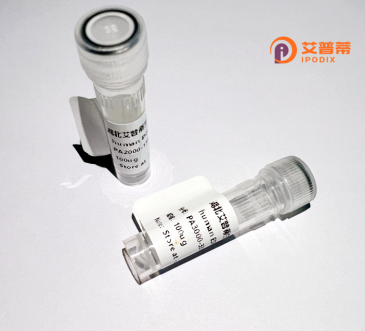
| 纯度 | >90%SDS-PAGE. |
| 种属 | Human |
| 靶点 | ANKRD16 |
| Uniprot No | Q6P6B7 |
| 内毒素 | < 0.01EU/μg |
| 表达宿主 | E.coli |
| 表达区间 | 1-361aa |
| 氨基酸序列 | MAQPGDPRRL CRLVQEGRLR ALKEELQAAG GCPGPAGDTL LHCAARHGHR DVLAYLAEAW GMDIEATNRD YKRPLHEAAS MGHRDCVRYL LGRGAAVDCL KKADWTPLMM ACTRKNLGVI QELVEHGANP LLKNKDGWNS FHIASREGDP LILQYLLTVC PGAWKTESKI RRTPLHTAAM HGHLEAVKVL LKRCQYEPDY RDNCGVTALM DAIQCGHIDV ARLLLDEHGA CLSAEDSLGA QALHRAAVTG QDEAIRFLVS ELGVDVDVRA TSTHLTALHY AAKEGHTSTI QTLLSLGADI NSKDEKNRSA LHLACAGQHL ACAKFLLQSG LKDSEDITGT LAQQLPRRAD VLQGSGHSAM T |
| 分子量 | 39.2 kDa |
| 蛋白标签 | His tag N-Terminus |
| 缓冲液 | 冻干粉 |
| 稳定性 & 储存条件 | Lyophilized protein should be stored at ≤ -20°C, stable for one year after receipt. Reconstituted protein solution can be stored at 2-8°C for 2-7 days. Aliquots of reconstituted samples are stable at ≤ -20°C for 3 months. |
| 复溶 | Always centrifuge tubes before opening.Do not mix by vortex or pipetting. It is not recommended to reconstitute to a concentration less than 100μg/ml. Dissolve the lyophilized protein in distilled water. Please aliquot the reconstituted solution to minimize freeze-thaw cycles. |
1. **"ANKRD16 prevents lysine-carrying tRNA misacylation and ameliorates neurodegeneration in mice"**
*作者:Tian, Y., Li, Z., Hu, W., et al.*
摘要:研究揭示了ANKRD16通过抑制Lys-tRNA合成酶的错误氨基酰化作用,防止神经毒性蛋白聚集,在神经退行性变(如脊髓小脑共济失调)中起保护作用。
2. **"The role of ANKRD16 in the regulation of protein misfolding diseases"**
*作者:Lee, J., Park, S., Kim, D.*
摘要:该文献发现ANKRD16作为分子伴侣辅助因子,协助纠正错误折叠的蛋白质,增强细胞在热休克或氧化应激下的存活能力,尤其与阿尔茨海默病相关病理相关。
3. **"ANKRD16 promotes cancer progression by modulating EGFR signaling in hepatocellular carcinoma"**
*作者:Zhang, L., Wang, X., Chen, R.*
摘要:研究指出ANKRD16在肝癌中高表达,通过稳定EGFR信号通路促进肿瘤细胞增殖和转移,提示其作为潜在治疗靶点。
4. **"Structural insights into ANKRD16's tRNA binding mechanism via X-ray crystallography"**
*作者:Gomez, M., Ito, T., Saito, K.*
摘要:通过X射线晶体学解析ANKRD16结构,揭示其锚蛋白重复域特异性结合tRNA的机制,为设计干预其功能的小分子奠定基础。
Ankyrin repeat domain-containing protein 16 (ANKRD16) is a vertebrate-specific protein belonging to the ankyrin repeat family, characterized by tandem repeats of ~33-amino-acid motifs that mediate protein-protein interactions. Initially identified as a nuclear protein, ANKRD16 is broadly expressed, with notable enrichment in the brain, particularly in Purkinje cells and motor neurons. Its conserved structure suggests roles in critical cellular processes, though its molecular functions remain under active investigation. A landmark 2017 Nature study revealed ANKRD16's neuroprotective role in preventing neurodegeneration caused by serine/arginine repetitive matrix protein 2 (SRRM2) mutations linked to amyotrophic lateral sclerosis (ALS). ANKRD16 binds to and stabilizes disordered proteins, suppressing their aggregation. Further studies highlight its involvement in tRNA surveillance, where it acts as a failsafe to correct mischarged Ser-tRNAAla, thereby maintaining translation fidelity. This function is vital in neurons, where errors in protein synthesis could drive neurodegenerative pathologies. ANKRD16 deficiency exacerbates disease phenotypes in ALS mouse models with SOD1 mutations, implicating it in disease modulation. Despite progress, its full interactome, regulatory mechanisms, and tissue-specific roles remain unclear. Ongoing research aims to unravel its potential as a therapeutic target for protein-misfolding disorders and neurodegenerative diseases.
×